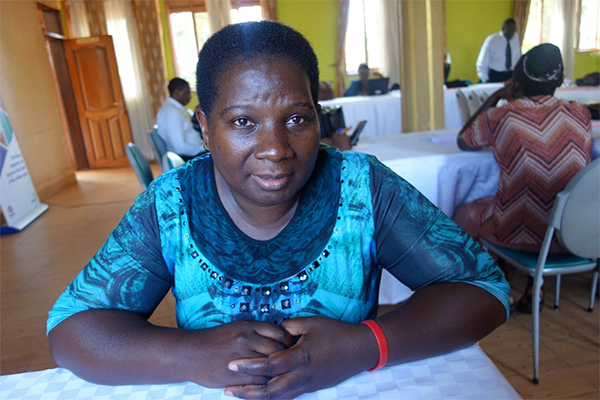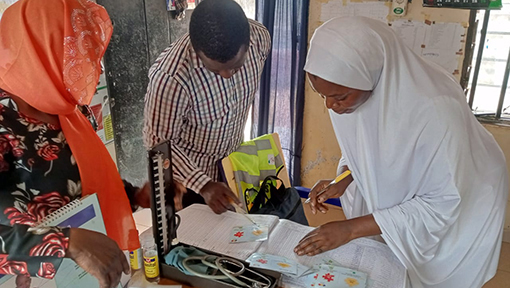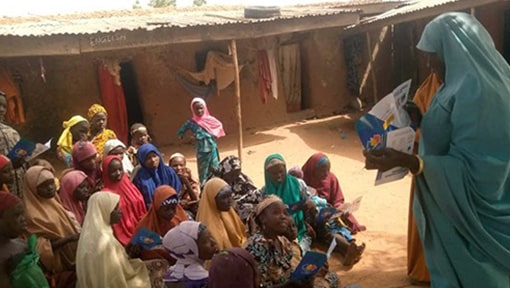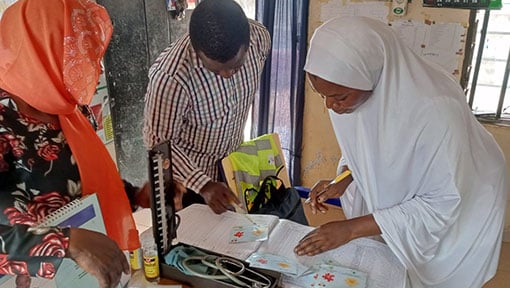IN THEIR WORDS: Whole-Site Orientation Approach Makes an Impact at Mukono Health Centre IV, Uganda
by Denis Sama | Oct. 17 2018In Their Words is a series of testimonials from those working with or benefitting from The Challenge Initiative.

Alex Namaala Lwasa is a nursing officer in Mukono, Uganda.
Alex describes the situation before The Challenge Initiative introduced the whole-site orientation approach at her health facility in Mukono, Uganda.
“Six months ago, Mukono Health Centre IV had very few partners for family planning. These partners were not so open to us and they wouldn’t build our capacity at all. They would just come, work and go away. We were only required whenever they needed support and working space. Although one later on provided us with some family planning products to boost our stock and onsite training to a few of our staff, we felt it was not enough. Most of the health workers were not confident to talk about family planning because they knew very little about it. The health workers were only providing pills and condoms without much family planning information, prompting many clients to come back with complaints. Only three out of twenty (15%) health workers were able to administer long-term family planning methods in this health facility. Clients who came to the health facility were not free to ask about family planning services, unless the health workers talked about it. But often times, the few knowledgeable health workers would get overwhelmed and tired and fail to talk about family planning since it was not in their routine. So many mothers would go away without any family planning information or method. If you don’t have information, it is hard for you to make a choice. In most cases, the mothers who came for family planning tended to ask for only methods which they had heard worked for someone else they know, thus limiting method mix. Most clients preferred Depo because of influence from other people and health workers were skilled and confident in providing it.”
Enter The Challenge Initiative
“It’s recent that we had TCI coming in with a totally different approach of doing business and I am seeing a very big change. The change is in the way we are now providing services – everyone is now able to provide family planning services because of the TCI whole-site orientation approach. After the TCI training, we conducted a whole-site orientation involving everyone, including people who are not health workers. For the technical staff, we usually have departmental meetings every Monday morning. So, we take advantage of this meeting to talk about family planning. We talk about the TCI Program and set topics for discussions in every meeting. We assign the trained health workers topics for discussion. For the support staff, we hold a two-hour discussion in the afternoons when most patients have gone and the staff are more free. For both technical and non-technical meetings, we show participants the various family planning methods and we allow them to physically touch with their own hands and appreciate. We also allow them to ask questions for clarification. We provide them with informational handouts for further reference and reading after the meeting. We make sure that everyone is confident and understands the different methods of family planning so that they provide the correct information to the clients they interact with. It is important for everyone to understand the advantages and disadvantages of the different family planning methods. To interest people [in the community], we put up signage showing that family planning is one of the services provided at this health facility. We have a special week for family planning every month where we involve all of the health workers in the health facility in family planning activities.”
After Conducting Whole-Site Orientations
“We have changed the way we offer our services. The capacity of health workers to provide quality family planning services has improved. Right now, everyone is confident to talk about the methods and counsel or advise clients on the method of choice. The moment you enter the health facility, everyone, starting with the askaris [security guards], cleaners, records persons and the health workers can talk about family planning. These people make sure that the clients don’t go without getting a family planning method of choice. Due to our family planning signage, people are now more interested in asking about family planning and any person they approach readily provides them with reliable information. When they ask at the gate, the Askaris direct them. Even mothers who bring their children for immunizations nowadays ask for family planning services and they are assisted, which was not the case before. Family planning services have been integrated in all service delivery points. At the moment, all the care points at this facility are able to provide short-term family planning methods, while clients for long-term methods are referred to the family planning clinic. The family planning clinic is open Monday to Friday every week. The attitudes and communication of the health workers has positively changed. Before they did not take it as an important issue to communicate about family planning. People now appreciate family planning and say it is a good service. Communication has greatly improved both at the facility and community where the village health teams (VHTs) give information. After giving them [clients] information about the advantages and disadvantages of the various family planning methods, they usually make an informed choice and they take what they see is good for them, which was not happening before. If you clear the misconceptions, give facts about the methods and assure them about your availability to help in case of any concerns, you will get many acceptors. We now provide a [more balanced] family planning method mix since the skills of the health workers has been improved. More health workers are now able to provide long-term family planning methods. Nowadays, IUD is the most preferred method followed by implants, not because they are new but because we now have the knowledge, skills and equipment for administering them. Ever since we started providing the long-term family planning methods, congestion at the family planning clinic has greatly reduced because few mothers come to the clinic. They come only when they want a method or when they have complaints or side effects which are really minor. So, we have reduced the frequency of the mothers’ visits to the hospital.






